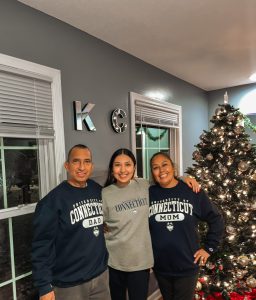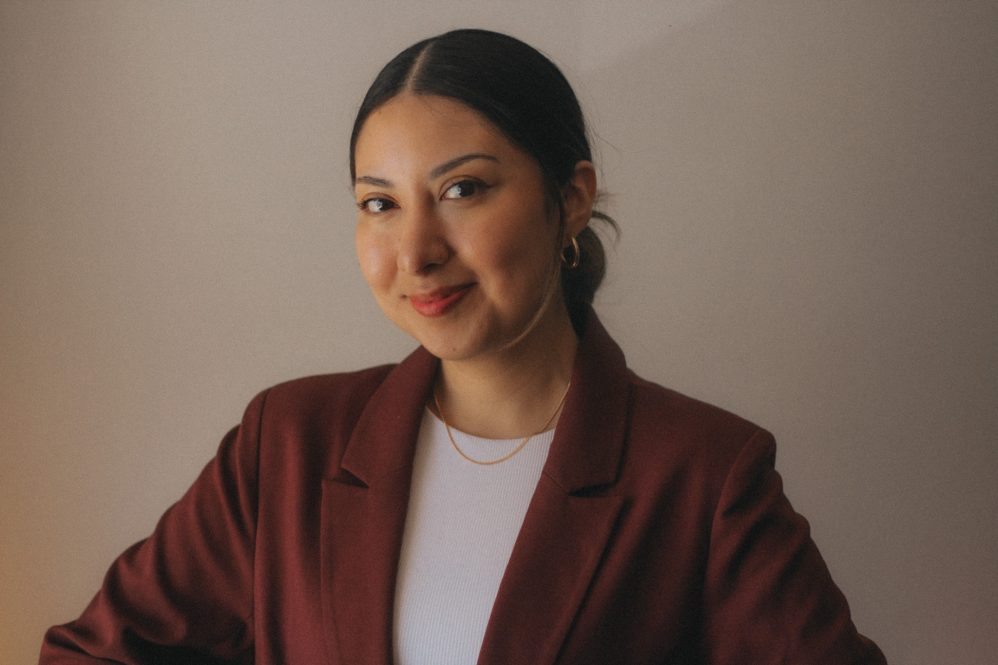Vanessa Esquivel, a Ph.D. student in the department of human development & family sciences, was recently awarded the Early Care and Education Research Scholars (ECERS): Head Start Dissertation Grant from the Administration of Children and Families of the US Department of Health & Human Services. The grant program provides support for dissertation research that informs early care and education policy and practice for low-income children and families.
Esquivel is the first UConn student to ever receive this grant, and her receipt of this grant marks the first time it has ever been awarded to any institution in Connecticut.
The federal Early Head Start (EHS) program is designed to support the development of infants and toddlers and provides family support services for low-income families through in-home visits or childcare-center-based support.
Esquivel is the first UConn student to ever receive this grant, and her receipt of this grant marks the first time it has ever been awarded to any institution in Connecticut.
Research has shown that EHS is a highly successful program, boosting children’s social-emotional, language, and cognitive development. But little research has been devoted specifically to understanding how Latine families experience EHS. This is the gap Esquivel is seeking to fill.
Exploring EHS Parent-Provider Relationships
Esquivel’s dissertation specifically focuses on the relationships between parents and EHS providers, building on previous research that highlights the importance of positive parent-provider relationships for the success of EHS children and families.
“When a child is an infant and toddler, these parents are building close relationships with their child’s EHS provider — it can almost resemble a co-parenting relationship,” Esquivel says. “At this age, it’s important for both the parent and the provider to be in agreement with each other and support each other. Although a lot of studies have looked at parent-provider relationships, there’s not much specifically on Latino families and what these relationships mean for them.”
Employing an explanatory mixed-methods research approach, Esquivel’s dissertation will explore how parent-provider relationships vary among Latine families, how they are associated with outcomes for children and families, and how Latine parents describe their relationship with their provider.
“I really want to understand what it means to the parents and ask these questions – how do you think [the relationship with your EHS provider] supports you, your child, and family well-being? All of this is to build a comprehensive understanding of parent-provider relationships among Latino families,” Esquivel says.
Esquivel hopes her study will improve policies and practices to ensure that early care and education programs, including EHS, are fostering environments where Latine parents and providers can build positive, trusting relationships for the healthy success of children and families.
“Centering and uplifting the voices of Latine families in the literature is another thing I hope my study will accomplish,” she says.
Esquivel is partnering with an Early Head Start program in her hometown of Kansas City (though the study will be open to Latine parents from other parts of the country) and working with faculty mentor Caitlin Lombardi, an associate professor in HDFS.
She credits Lombardi for her unwavering support and encouragement throughout her doctoral studies and guidance on the grant application process.
“I’m really grateful for my advisor, for Dr. Lombardi, because she played a big role in providing support and that, ‘Yeah, you got this!,’ cheering me on all the way,” she says.
¡Échale ganas!
For Esquivel, this research is a full-circle moment, allowing her to give back to the family and community who raised her.
“Growing up, we had a home visitor, and this person actually became a part of the family: she was not only a home visitor for me and my sisters, but also for my aunts and cousins,” she explains. Looking back, Esquivel realizes how important this early childhood experience was for her and her family.
Esquivel’s partnership with the EHS program in Kansas City will also allow her to foreground experiences much like her family’s.
“I’m not only going to be conducting a study with a topic I feel very passionate about — there’s also that emotional piece of going back home and doing some work in my city, with families from my city,” she says.
In addition to her dissertation award, Esquivel has also recently received a professional development grant from the National Research Center on Hispanic Children & Families. This grant, she says, will help her share her dissertation research at more conferences and forge more research connections for her future work.

As she reflects on her academic career, she has a lot to be proud of.
“It’s a really proud moment for me as a first-gen student, as a daughter of Mexican immigrants,” Esquivel says. “I’ve always really admired my parents’ hard work. Growing up, they always said a phrase in Spanish: échale ganas. Basically, it means to work hard. I remember my parents always telling me to go to school and get an education. They would always remind me of the power of knowledge. So, the PhD – getting into the program and making it this far – was already a big accomplishment, but receiving such a prestigious dissertation award makes me so proud of where I am. I’m so thankful for my family and all the sacrifices they made to get me here, and the support I’ve had from my community.”
As for what lies ahead after completing her Ph.D., Esquivel shares she would love to stay in the research world to continue growing as a scientist.
“After some time of gaining experience in the research field, I would love to come back to an academic space in a professor role. So that’s the plan, that’s the dream,” she says.


